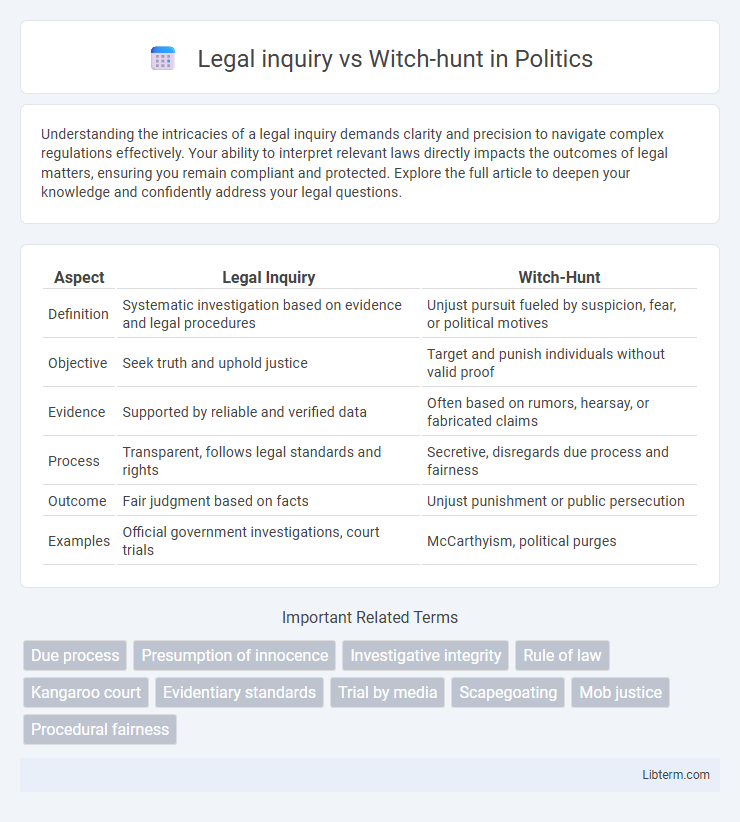Understanding the intricacies of a legal inquiry demands clarity and precision to navigate complex regulations effectively. Your ability to interpret relevant laws directly impacts the outcomes of legal matters, ensuring you remain compliant and protected. Explore the full article to deepen your knowledge and confidently address your legal questions.
Table of Comparison
| Aspect | Legal Inquiry | Witch-Hunt |
|---|---|---|
| Definition | Systematic investigation based on evidence and legal procedures | Unjust pursuit fueled by suspicion, fear, or political motives |
| Objective | Seek truth and uphold justice | Target and punish individuals without valid proof |
| Evidence | Supported by reliable and verified data | Often based on rumors, hearsay, or fabricated claims |
| Process | Transparent, follows legal standards and rights | Secretive, disregards due process and fairness |
| Outcome | Fair judgment based on facts | Unjust punishment or public persecution |
| Examples | Official government investigations, court trials | McCarthyism, political purges |
Understanding Legal Inquiry: Definition and Purpose
Legal inquiry is a systematic investigation conducted by judicial or law enforcement authorities to gather evidence, assess facts, and determine legal responsibilities or violations. Its purpose is to ensure fairness, uphold justice, and protect individual rights through adherence to established laws and procedures. Unlike witch-hunts, legal inquiries rely on objective evidence and due process rather than bias or unfounded accusations.
What Constitutes a Witch-Hunt?
A witch-hunt constitutes an unjustified and often politically motivated campaign to accuse and persecute individuals without credible evidence or fair procedure, driven by paranoia or scapegoating. Legal inquiries rely on factual evidence, due process, and transparency to ensure accountability and justice, whereas witch-hunts thrive on fear, bias, and the suppression of dissent. The key distinction lies in the legitimacy and fairness of the investigation, with witch-hunts characterized by their disregard for legal standards and presumption of innocence.
Key Differences Between Legal Inquiry and Witch-Hunt
Legal inquiry is a structured, evidence-based process conducted by authorized authorities to investigate allegations while adhering to due process and legal standards. Witch-hunt refers to a biased, unjust pursuit targeting individuals without credible evidence, often driven by paranoia or personal vendettas. The key differences lie in legitimacy, impartiality, and adherence to rule of law versus emotional, prejudiced persecution lacking legal basis.
Legal Standards in Formal Investigations
Legal inquiries adhere strictly to established legal standards, including the presumption of innocence, evidentiary rules, and procedural fairness, ensuring that investigations are impartial and based on credible evidence. Witch-hunts, by contrast, bypass these standards, often relying on rumors, stereotypes, or political motives, resulting in biased, unjust accusations without proper legal safeguards. The integrity of formal investigations depends on adherence to legal standards that protect individual rights and promote objective fact-finding, distinguishing them sharply from the arbitrary nature of witch-hunts.
Historical Context of Witch-Hunts
Historical witch-hunts often involved mass hysteria and unfounded accusations fueled by superstition, contrasting sharply with legal inquiries grounded in evidence and due process. Witch-hunts in Europe between the 15th and 17th centuries led to thousands of trials and executions based on spectral evidence, confessions extracted under torture, and community scapegoating. Legal inquiries require systematic investigation and judicial standards that were largely absent from the arbitrary and fear-driven practices of historical witch-hunts.
Safeguards Against Unfair Prosecution
Legal inquiry operates within established judicial frameworks, ensuring evidence-based examinations and adherence to due process, which safeguard individuals from arbitrary accusations. Witch-hunts, by contrast, are driven by mass hysteria or political motives, lacking legal standards and often resulting in persecution without substantiated proof. Implementation of procedural safeguards, including the presumption of innocence, right to legal counsel, and transparent investigation protocols, are essential to prevent abuses characteristic of witch-hunts.
The Role of Evidence in Legal Inquiries
Legal inquiries rely on the careful collection and analysis of evidence to ensure justice and fairness in decision-making. The role of evidence in legal inquiries is to establish facts objectively, supporting the legal process and protecting individuals' rights. In contrast, witch-hunts disregard evidence, often fueled by fear and bias, leading to unfounded accusations and miscarriages of justice.
Public Perception: Legal Inquiry vs Witch-Hunt
Public perception of a legal inquiry hinges on its foundation in evidence, due process, and impartiality, fostering trust in the justice system. In contrast, a witch-hunt is perceived as driven by bias, fear, or ulterior motives, often leading to public skepticism and damage to reputations without substantiated proof. Distinguishing between the two shapes societal trust and the legitimacy attributed to investigations.
Media Influence on Investigations and Witch-Hunts
Media influence significantly impacts both legal inquiries and witch-hunts by shaping public perception and pressure on investigative bodies. Sensationalized reporting often blurs the line between factual evidence and rumor, accelerating the progression of witch-hunts with reduced emphasis on due process. Legal inquiries require careful adherence to evidence and procedure, yet media-driven narratives can compromise impartiality, leading to premature conclusions and miscarriages of justice.
Ensuring Justice: Best Practices in Legal Proceedings
Legal inquiry emphasizes evidence-based investigation, adherence to due process, and the protection of individual rights to ensure justice is fairly administered. Witch-hunts, by contrast, involve biased accusations, lack of concrete evidence, and disregard for legal standards, often resulting in unjust persecution. Best practices in legal proceedings include maintaining impartiality, thorough fact-finding, and upholding transparency to prevent miscarriages of justice.
Legal inquiry Infographic

 libterm.com
libterm.com